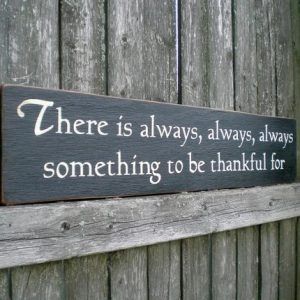Aren’t you glad you have a choice? I know there are times when we feel like we are drowning in negativity, financial woes, health challenges, etc. SO MANY things befall us that are beyond our control (although, some we bring upon ourselves), it sometimes doesn’t seem fair. But we ALWAYS have a choice in our approach to our circumstances. The ancient Greek philosopher, Epictetus, once said that “it’s not what happens to you, but how you react to it that matters.” We have a wall hanging that reads, “There is always, always, always something to be thankful for.” The words of Epictetus and the message on the wall hanging both highlight a choice – the choice to practice gratitude.
Practicing Gratitude

Practicing Gratitude
But the practice of gratitude is largely under-recognized. It can be profoundly powerful, and is – in my opinion – one of the key practices in positive psychology. Many clinicians and social scientists agree. Hefferon & Boniwell (2011) assert that “gratitude is the underlying concept for many positive psychology interventions as it promotes the savouring of positive events” (p. 163). (Kate Hefferon & Ilona Boniwell, Positive Psychology: Theory, Research, and Applications; p.163). And from the Harvard Medical School (the Harvard Mental Health Letter), “Gratitude helps people feel more positive emotions, relish good experiences, improve their health, deal with adversity, and build strong relationships” (November, 2011).
The great thing about practicing gratitude is that there is literally NO downside! There have been some studies that suggest that some groups of people were not as positively impacted from practicing gratitude than others. For example, in one study, children and adolescents sent a thank you letter to someone that made a difference in their life. While the person receiving the letter may have felt appreciated, the act of writing and delivering the letter did not significantly improve the well-being of the sender. This finding suggests that a deep sense of gratitude – and its benefits to our overall well-being – is more closely associated with emotional maturity. But even in this study, the expression of gratitude at least helped the recipient. The point is, this is one practice that is definitely worth a try!
Cultivating Gratitude
It’s difficult for a lot of us to break free from “the grass is always greener…” mentality. Many of us believe that we’ll be happier when “this happens” or when “that goes away.” Cultivating gratitude allows us to more fully appreciate what we have – our current situation – rather than always on the lookout for some new pathway to happiness.
Here are three simple strategies to help cultivate gratitude starting today!
Gratitude Journals. Grab a simple notebook (“composition books” or spiral-bound notebooks are very inexpensive), and take a moment each day to write down something you’re grateful for, something positive that happened during the day, etc. I suggest taking it further than simply writing a list. If you really ponder how thankful you are for something, you can allow yourself to actually experience the emotion of gratitude while you’re reflecting on it and writing it down. For example, it’s a quick and easy task to jot down things I’m grateful for: a home to live in, the gift of sight, etc. But when I really consider how life would be different if I didn’t have the comforts of our home, or be able to see the beauties of the world around me, my heart swells with gratitude. And, my compassion grows for those who are less-fortunate.
Write and Deliver a Thank You Note. One powerful way to enhance a relationship is to express gratitude and appreciation. Whether for a particular act of kindness, or because we simply enjoy their presence in our life, writing a thank-you note will likely boost the happiness meter for both of you. Send it in the mail (it’s nice to get something positive in the midst of all the bills and advertisements), or better yet, deliver it in person. You can even read it in person for a whole new level of relationship-building. Set a goal to regularly write and send a thank-you note (Once a week? Once a month?) and chances are you’ll notice an improved sense of happiness within yourself.
Count Your Blessings. Choose a day of the week to reflect upon and write down the many blessings in your life. It’s easy to become overwhelmed by the many challenges that come our way, and if we’re not careful, they can easily overshadow all the good stuff. Investing some time each week in bringing the things we’re grateful for to the top of the list can help put things into perspective, and keep the flames of hope and optimism burning brightly.
A word of warning: the minute “practicing gratitude” begins to feel like a chore – that “one more thing I have to do” attitude – the benefits of recognizing the blessings in life seem to diminish. So, if you can approach this as an opportunity for loving life, it just may deliver.
Dr. Clark Hammond, LMFT




